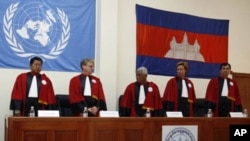International human rights groups are calling for stronger action by the United Nations to prevent Cambodian government interference with the tribunal on Khmer Rouge war crimes.
The Open Society Justice Initiative, which has been monitoring the Khmer Rouge trials, said Tuesday that a "crisis of confidence" has been created by this week's announcement that a German investigating judge has resigned to protest official interference.
In a separate statement, Amnesty International said it is "vital" that the U.N. act to safeguard the future of the U.N.-backed tribunal.
In New York, a U.N. spokesman said the organization is working urgently to get a new judge in place to replace Siegfried Blunk, who submitted his resignation late last week.
Blunk is to be replaced by Laurent Kasper-Ansermet of Switzerland, who has already been named as the reserve co-investigating judge.
In announcing the judge's resignation, a U.N. spokesman said senior government officials, including Prime Minister Hun Sen, have repeatedly argued that the tribunal should not pursue any more cases. It pointed out that Blunk initiated contempt of court proceedings against Cambodia's information minister over one such remark in May.
Prime Minister Hun Sen has said he believes further prosecutions would be deeply divisive and could undermine the stability of the country.
In Phnom Penh Tuesday, the head of the Center for Cambodian Civic Education, Seng Theary, called on the United Nations to pressure the Cambodian government to support tribunal prosecutions.
"The U.N. needs to do a lot more than just pushing Blunk to resign, so this is a tiny step that does not affect the direction, and the direction is heading the wrong way," Theary said. "We need to change course, the United Nations needs to take the steering wheel, needs to pressure and leverage the government, its partner, and it has the ability to do so."
Blunk, a German, had been working alongside fellow investigating judge You Bunleng of Cambodia, to investigate two additional cases submitted by prosecutors. However, the two were accused of caving in to government pressure when they announced in April they had concluded their investigation in Case 003 without interviewing key witnesses or visiting suspected crime scenes.
There are also accusations that the judges have not thoroughly investigated Case 004. Several tribunal staff members resigned earlier this year to protest the handling of the cases, and Human Rights Watch called last week for both investigating judges to resign.
Some information for this report was provided by Reuters.




